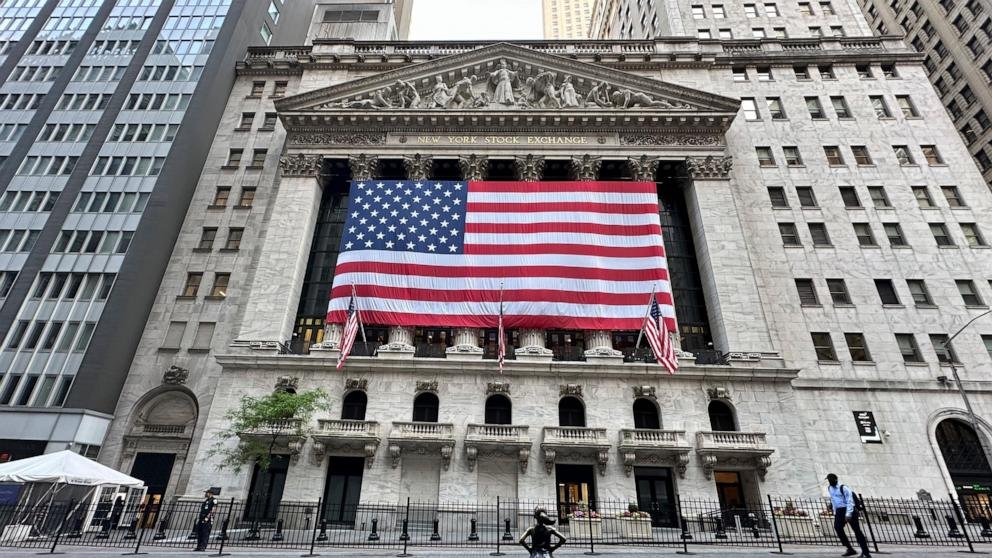Asian stocks rise as investors ignore further Wall Street decline
Asian shares rose on Friday as investors ignored further losses on Wall Street while an official survey showed manufacturing activity in China weakened.
Tokyo’s Nikkei average rose 1.2 percent to 38,119.96 after reports of big investment plans by government-backed pension funds and other big institutional investors spread.
The Nikkei newspaper reported that Japan is preparing to follow the lead of the Government Pension Investment Fund (GPIF) and inject nearly 100 trillion yen ($638 billion) more public funds into the market.
Chinese stocks rose even as surveys showed a prolonged crisis in the real estate sector was putting further pressure on an already burdened economy, but negative readings often spark speculation that Beijing will respond with pro-growth policies.
Hong Kong’s Hang Seng Index rose 1.2% to 18,446.05, while the Shanghai Composite Index rose 0.3% to 3,099.72.
Australia’s S&P/ASX 200 rose 0.5% to 7,668.90 and Seoul’s KOSPI rose 0.4% to 2,646.44.
Taiwan’s Taiex fell 0.9% as shares in Taiwan Semiconductor Manufacturing Co. (TSMC), the market’s largest computer chip maker, fell 2%, following declines in other major technology companies.
Nvidia shares fell 3.8% on Thursday after a big surge in the stock price on Wall Street’s enthusiasm for artificial intelligence technology.
Nvidia’s losses pushed the Nasdaq Composite down 1.1%, while the S&P 500 index fell 0.6%, despite gains for most stocks in the index and across Wall Street. The Dow Jones Industrial Average fell 0.9%.
Friday sees the release of a monthly update on the Federal Reserve’s favorite inflation gauge. Late-day earnings reports will also be another driver for the market, with earnings forecasts for early 2024 coming in ahead of expectations.
Supporting the market on Thursday were better-than-expected profit reports from a range of companies. Best Buy Co. Inc. rose 13.4% after it beat expectations even though its revenue for the last quarter fell short of expectations. Foot Locker Co. also rose 15% after it reported better-than-expected profits even though its sales fell short of analysts’ expectations.
Stocks also broadly rose on the back of lower Treasury yields, which provided relief after stocks rallied earlier this week on concerns about weak demand for government bonds after several U.S. government bond auctions. Rising yields put downward pressure on all investments.
Yields fell on Thursday after several reports showed the U.S. economy was not as strong as expected.
A report said more U.S. workers filed for unemployment benefits last week than expected, but the number of people laid off remains at historically low levels, while another suggested overall U.S. economic growth may not have been as strong as initially thought.
The economic slowdown could give the Fed more confidence that inflation is falling sustainably toward its 2% target, which could prompt it to cut the federal funds rate, which is at its highest in more than two decades.
The yield on the 10-year Treasury note fell to 4.54% from Wednesday’s close of 4.62%. The yield on the two-year note, which better reflects expectations of Fed action, fell to 4.92% from 4.98%.
Among other gainers, software company C3.ai rose 19.4% after it beat both earnings and revenue expectations in its latest quarter, while HP rose 17% after its profits beat expectations slightly.
Many retailers are also reporting financial results as usual to close out the earnings season, but they are coming under intense scrutiny amid concerns about whether American households can keep up with spending, as still-high inflation hits retailers, especially lower-income consumers.
In other trading early Friday, benchmark U.S. crude oil fell 28 cents to $77.63 a barrel in electronic trading on the New York Mercantile Exchange, while the international standard Brent crude lost 21 cents to $81.67 a barrel.
The U.S. dollar fell to 156.78 yen from 156.82 yen. The euro fell to 1.0822 dollars from 1.0834 dollars.

